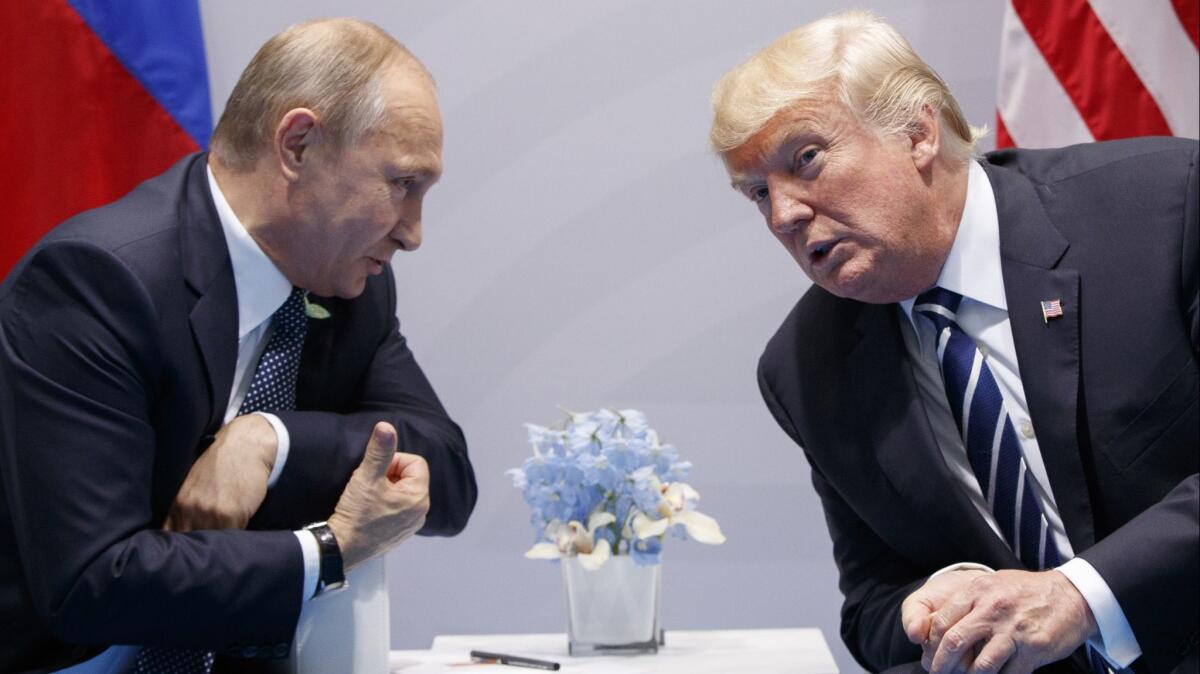Editorial: Trump is trashing arms control treaties and making the world more dangerous

Since 1947, the Bulletin of the Atomic Scientists has maintained a so-called Doomsday Clock designed to indicate how close the world was to a catastrophe caused by nuclear war or, more recently, other causes such as climate change.
In January, the group moved the clock to 100 seconds to midnight, the direst setting yet. Among other reasons for the change, the group blamed world leaders who “denigrate and discard the most effective methods for addressing complex threats — international agreements with strong verification regimes — in favor of their own narrow interests and domestic political gain.”
The Doomsday Clock is a symbol to be taken seriously, not literally. But its custodians are right to sound the alarm about leaders who seek to undermine arms control agreements. One of them is the current president of the United States.
First, Donald Trump repudiated the international agreement that made it harder for Iran to develop nuclear weapons. Then, claiming that Russia was cheating, he disavowed the 1987 Intermediate-Range Nuclear Forces Treaty signed by President Reagan and Soviet leader Mikhail Gorbachev.
Finally, last month Trump said he was pulling the United States out of the Open Skies Treaty signed in 1992. Under that agreement, 34 nations allow each other’s reconnaissance aircraft to fly over their territory to monitor possible troop movements and missile installations. In announcing that it would withdraw from the treaty, the Trump administration cited both Russian restrictions on where U.S. planes could fly in that country and financial costs associated with replacing surveillance aircraft.
The administration’s announcement jolted America’s European allies, who rely on information from the surveillance flights to keep track of Russian military exercises on NATO’s eastern flank. Retired Air Force Gen. Michael Hayden, the former director of both the Central Intelligence Agency and the National Security Agency, said Trump’s decision to withdraw from the Open Skies Treaty was “insane.”
Trump indicated that he could change his mind about withdrawing from the Open Skies Treaty if Russia complied fully with the agreement. But by announcing that the U.S. would withdraw — rather than challenging Russian restrictions before a commission established to implement the treaty — he gave Russia no incentive to modify its behavior. If Trump goes through with the withdrawal, the U.S. and its allies will be denied valuable information about Russian intentions.
As a result of Trump’s actions, there remains only one significant arms control treaty binding the U.S. and Russia, the 2010 New START Treaty, which places limits on intercontinental ballistic missiles, nuclear warheads, missile launchers and nuclear-armed bombers. It will expire in February unless the two nations agree to extend it for up to five years.
Russia has said it is willing to extend the pact unconditionally; the Trump administration has declined to make that commitment, with U.S. arms control negotiator Marshall Billingslea calling the treaty “the wrong framework for the future.” Instead, the administration has said it would try to negotiate an agreement to replace New START.
But the administration is insisting that a new version of the START treaty also include China, which has a much smaller nuclear arsenal than Russia and the United States. Beijing has indicated that it has no interest in taking part in arms control negotiations with the other countries.
In the past, Trump has said that the arms race between the U.S. and Russia was “getting out of control” even as he has pressed to create a Space Force, develop new supersonic missiles and resume nuclear weapons tests. And his aversion to arms control treaties with Russia might also seem hard to reconcile with his general policy of courting Putin — manifested most recently in his suggestion that Russia might be invited to the Group of 7 summit in Washington, D.C., later this year (along with India, Australia and South Korea). But Russia may actually welcome U.S. withdrawal from arms control agreements that constrain it as well as the United States.
Arms control agreements aren’t a panacea, and the ultimate goal should be to eliminate nuclear weapons, not just reduce their numbers. That is because, even with limits on stockpilesand weapons development more drastic than now exist, the possibility of a nuclear war would remain. Still, arms control agreements are worth pursuing and preserving — especially if they involve rigorous inspection — because they make it less likely that leaders will be tempted to use nuclear weapons.
Trump seems oblivious to that reality. On the other hand, former Vice President Joe Biden, Trump’s likely Democratic opponent, has promised to pursue an extension of the New START treaty and to have the U.S. join the Iran nuclear agreement if Iran returned to full compliance with its terms. It looks as if a re-commitment to nuclear arms control by the U.S. will require the election of a new president.
More to Read
A cure for the common opinion
Get thought-provoking perspectives with our weekly newsletter.
You may occasionally receive promotional content from the Los Angeles Times.










